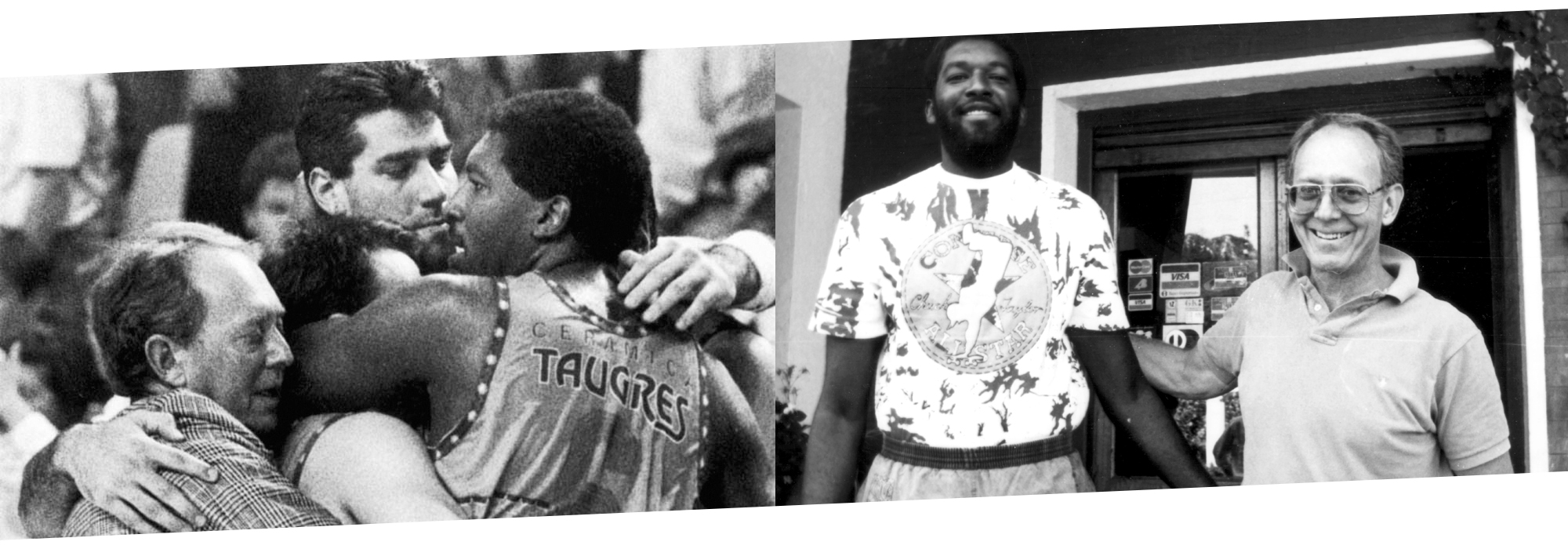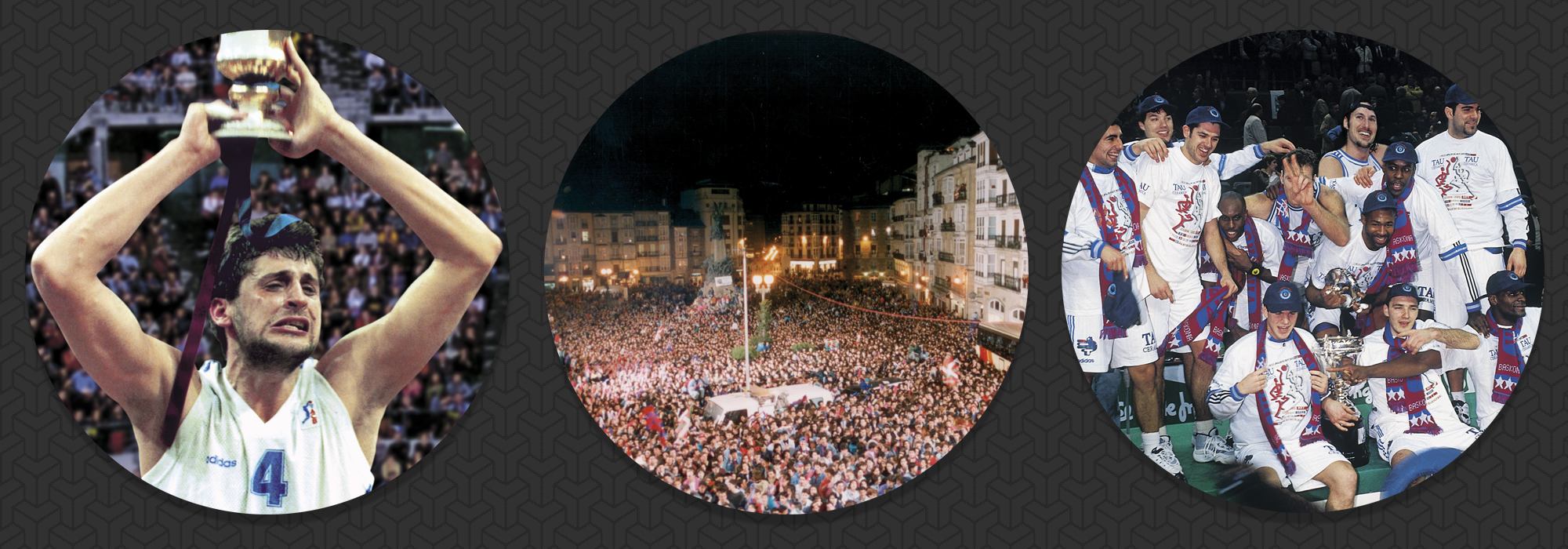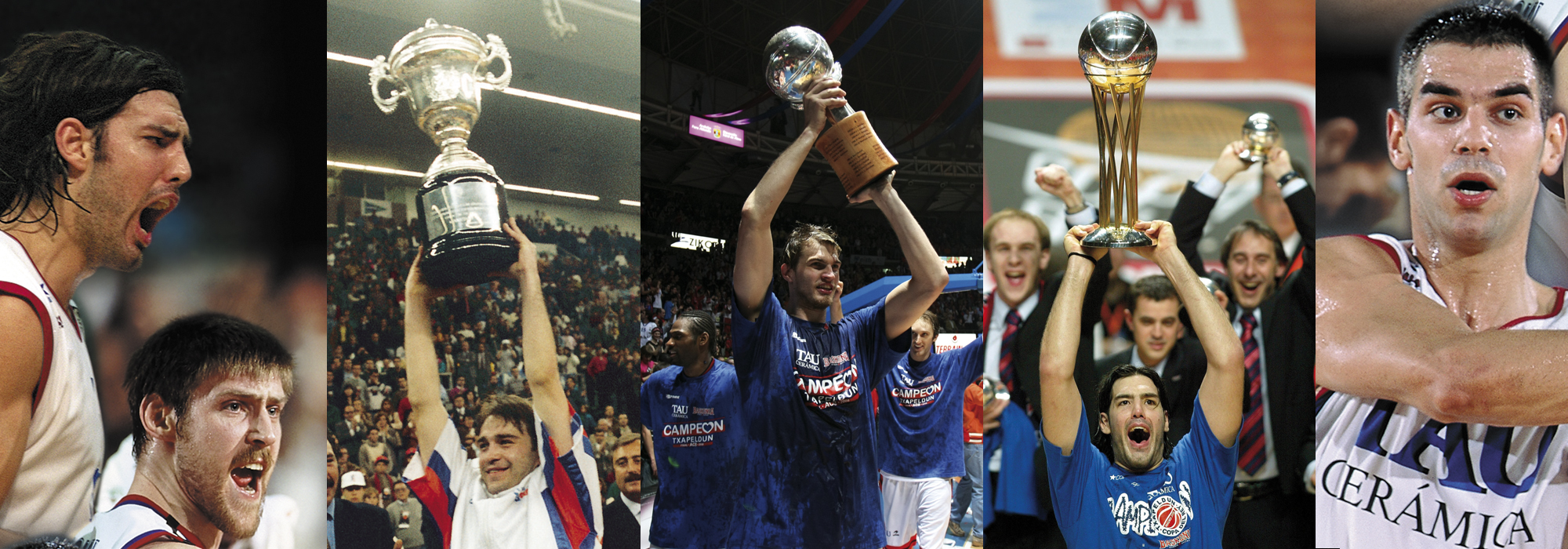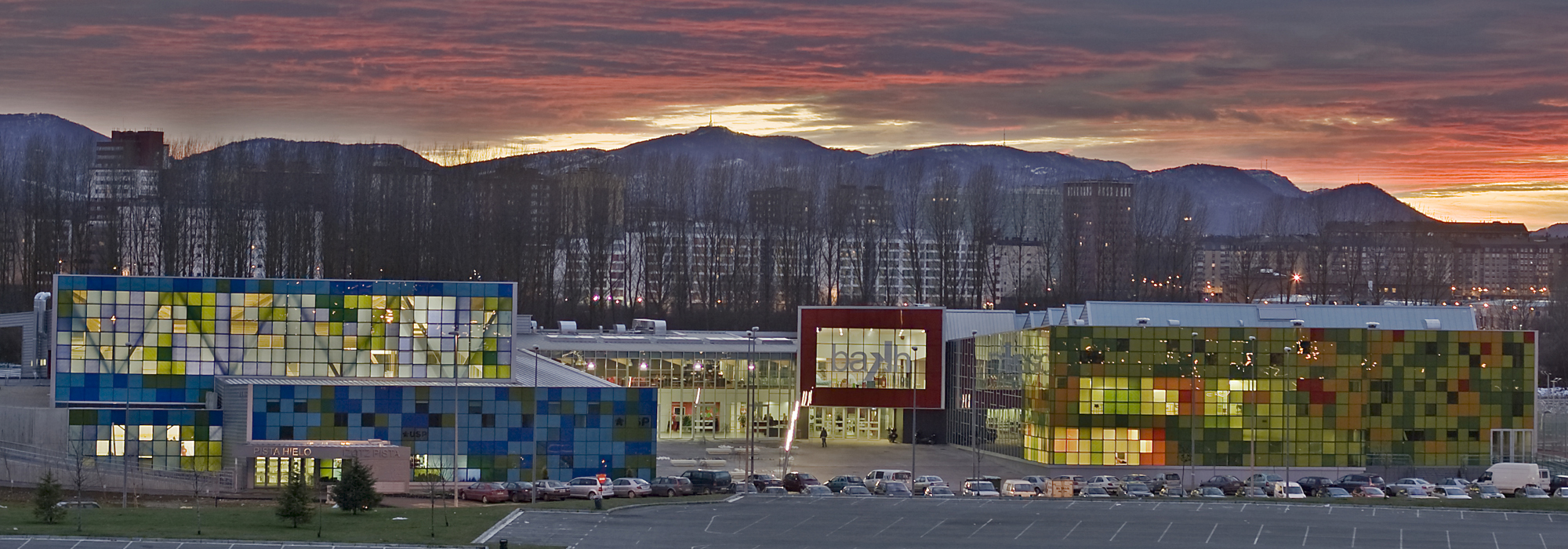Saski Baskonia S.A.D. is currently one of the most important clubs in the country and its name gives rise to respect in Europe. There is no more decisive proof of this than the double in the 2001/02 season, when the King’s Cup and the ACB League were won, or its consecutive presence in four Final Fours. However, in order to reach this level of success, the Club has had to take many steps, sometimes small other times gigantic, since its foundation in the distant year of 1959.
The Club’s beginning in sport
The team, currently in the European elite, was born as a section of the Club Deportivo Vasconia, in the days when Don Félix Ullivarriarrazua was president. It was in 1959 when, from the club’s presidency, it was decided that a basketball section was to be organized, following the sport’s line of promotion that the association had in place. In the end, the director Jesús Peña Ranero was named as the man in charge of the new section, while Vicente Elejalde took charge of the bench. The foundations had just been laid for a project which would gradually gain strength and obtain results. Although it would still take several years to reach the top level, the new basketball team’s start in official competitions was to be a good omen. In its first season CD Vasconia finished in second position in the provincial championship, only beaten by Corazonistas, a team from a school in the Álava capital.
The emerging Vasconia became the dominant team in the provincial championship during the 1960s, as it won five championships. Subsequently, in 1970, the club obtained its first “official” title after coming first in the Third Division championship.
Promotion to the First Division
A result of this tireless eagerness to improve was the promotion achieved in the 1972/73 season, when Vasconia made its debut in the top division of national basketball with the legendary Pepe Laso on the bench. Its first game in the top flight resulted in a comfortable victory, 92-71, against Breogán from Lugo. That season’s roster was made up of the following players: Pinedo I, Pinedo II, “Choche” Armentia, Carlos Luquero, Amado Ubis, Ibáñez “Pichu”, Jesús Arana, José Luis Lázaro, Francisco Javier Zurrutuza, Javier Buesa and Ramón Díaz de Argote.
In the 1976/77 season the club’s official change of name was considered. President José Luis Sánchez Erauskin took the decision to change the V to B in the club’s name, thus becoming Basconia-Schweppes.
In a history as extensive as Baskonia’s it’s logical for there to be setbacks and disappointments. In the 1980/81 season Baskonia was relegated to the Fist Division B and after making promotion the objective for the following season, the club was promoted and triumphantly returned to the First Division.

The new ACB League
The team’s return to the elite coincided with the firm decision to start a professional basketball league. In the 1983/84 season the ACB League started, with a managerial project with the aim of achieving a totally professional national competition, where our club was one of the founders.
Baskonia fitted in perfectly with this philosophy and it can be said that it grew simultaneously with the ACB League. In fact, with the passing of time it became a historically important club in national basketball, together with other potentially strong clubs, to the already classic Real Madrid and Barcelona.
In 1985, the club obtained its first official title, the Copa Asociación (Association Cup), which was contested between the teams eliminated in the first round of the play offs. In the final Arabatxo Baskonia defeated CAI Zaragoza (93 to 85) in Villanueva de la Serena, Badajoz.
Thanks to that victory Baskonia entered Europe for the first time. The club made its debut against the Dutch team Super Cracks, who it defeated, only to then lose to Villeurbanne from France. During those years foreign players with contrasting quality such as Essie Hollis, Terry White, Abdul Jeelani and Larry Micheaux, played for the club leaving good memories for the fans. It also coincided with the first team debut of the young and promising Pablo Laso and Alberto Ortega.
In 1987, a fruitful relationship would start with Taulell S.A., through its brands Taugrés and TAU Cerámica, becoming the oldest sponsor of the ACB to the present day, and one of the most loyal at a sporting level.
Together with this decisive event, another took place that would determine the Club’s future. Recently retired player Josean Querejeta was elected as the club’s president in the 1988/89 season, and one of his first actions was to make the club the first sports corporation in the state, changing the name to Saski Baskonia S.A.D.

Among the elite
A major step for the evolution of Baskonia was the change of the stage for the games. The lovely arena of Mendizorroza started to get too small sometimes due to the influx of spectators and even the ACB League demanded to have at list a capacity for 5.000 fans. Therefore, it was decided to build another stadium and after negotiating with the Institutions of Araba, the reform of the old arena located in Vitoria-Gasteiz into a basketball stadium began. The Araba Pavilion, then named Buesa Arena, began to host the best seasons of the history of the Club, in which began to rub shoulders with the European elite teams.
The official inauguration of the Araba Pavilion was in September 1990 with a match between Taugres and Atletico de Madrid with players such as Walter Berry and Shelton Jones.
With the presence of Josean Querejeta at the front of the Club, Baskonia began to climb steps on the National and European scale, backed up by a solid project and a spectacular playing style. Players of the category of Sibilio, Rivas, Arlauckas, Marcelo Nicola, Velimir Perasovic or Kenny Green came to Vitoria-Gasteiz.
Sporting results soon came. In the season 1991/92, Taugres comes back to Europe and since then it has been a regular contender on international competitions. The Club´s name began to sound In Europe thanks to the presence on the finals of the Saporta Cup of Lausanne, Istanbul and Vitoria-Gasteiz. We had to wait until the finals came to the Buesa Arena in order to savor the sweetness of success. With Manel Comas on the bench as head coach, a Buesa Arena packed to the rafters and stellar performances by Rivas, Nicola and a huge Garbajosa, the Saporta Cup found a perfect spot in the windows of Baskonia.
At the national level success also came. TAU Ceramica became King of Cups with the triumphs in Granada 95, Valencia 99, Vitoria-Gasteiz 02, Sevilla 04, Madrid 06, and Madrid 09 apart from the presence on the finals of Sevilla 94, Madrid 06 and Madrid 09.
New Araba Arena
The 1998-99 season was also marked by the necessary expansion of the Abara Arena up to 9,500 people and the team´s debut in the best competition of the continent, the Euroleague, another step into greatness for the Club. The expansion of the pavilion was achieved by raising the dome, with a weight of nearly 360 tons, 11.35 m. over the 7.63 m. to which it had been since the beginning and expanding the diameter of the dome from 76 to 96 m.
In the season 2001-02 the team achieved the coveted prize. Tau Ceramica touched the sky after taking over Unicaja by a blunt 3-0. Baskonia, leaded by Dusko Ivanovic from the bench, counted with a great team: Bennet, Corchiani, Vidal, Foirest, Nocioni, Sconochini, Scola, Oberto, Tomasevic, Gaby Fernández and ChristosHarissis.
The winds of change and modernity came to European basketball at the end of the 20thcentury with the creation of the ULEB. In the recently inaugurated Euroleague, 2000-01, TAU got to play its first European final against the powerful Kinder of Bologna. After five ultra-disputed games, the Cup staid in Italy.
TAU Ceramica did not quit on their will to consolidate among the biggest of Europe. And they actually achieved it with their presence on the Final Fours of Moscow 05, Prague 06, Athens 07 and Madrid 08. This was a socially and sportively recognized milestone and it was defined as “a great team in a pocket city” by one of the most recognized newspapers of Europe.
During their first participation the Vitorian team defeated the host, CSKA Moscow by 78-85 in the first round. In the finals they had to face Maccabi Tel Aviv and Baskonia ended as runner-up after losing 90-78.
In the year 2006, Baskonia was again part of the European elite and disputed the Final Four of Prague finishing in third place. They repeated for the next two consecutive years with notable performances in the European contest.
The team kept growing and during the season 2007-2008 the team achieved its second regular league title after defeating FC Barcelona 3-0. Coached by Neven Spahija, the roster formed by players such as Pablo Prigioni, Sergi Vidal, Zoran Planinic, Tiago Splitter or Simas Jasaitis, completed a year to be remembered.
During the season 2009-2010 the team changed the main sponsor and left behind the relation of over two decades with the previous. It was renamed Caja Laboral after this. This season the Vitorian team achieved its last League Title after defeating FC Barcelona with an outright 3-0. Fernando San Emeterio got a memorable 2 and 1 that meant the third title for Baskonia in the national competition.

New Buesa Arena
On 9th Abril 2012 the revamped Buesa Arena was reopened with an expanded capacity of 15,504 spectators. That same night the arena set a new attendance record for ACB games. The historic game concluded with a 67-66 victory in favour of Caja Laboral over Real Madrid in what was a return home for Andres Nocioni after several seasons in the NBA.
In the 2013-2013 season, the team changes its name to Laboral Kutxa. The club is an established force in the European elite and is a regular in the EuroLeague Top16.
From 2013 to 2015 the team maintains a good level both in the Liga Endesa as well as the EuroLeague, coming 6th in the regular league in both seasons and playing in the Top16 in the EuroLeague.
Final Four as a prelude to the New Era
In the 2015-16 campaign, Baskonia became a leading team in Europe once again. Lead by Velimir Perasovic, and after an absence of 10 years, the team reaches the Final Four in Berlin after an excellent EuroLeague with victories over teams such as Panathinaikos, CSKA and Fenerbahce. The team reached the semi-finals of the Liga Endesa losing out to FC Barcelona.
In the 2016-2017 season, the season of the New Era, Sito Alonso takes over at the helm and the team adopts the name of Baskonia. The club from Vitoria, one of the founding teams of the European competition, reaches the play-offs of the most competitive ever EuroLeague, leaving great continental teams in its wake. In the Liga Endesa, Baskonia finished second in the regular season and qualified for the semi-finals.
The 2017-18 campaign begins with the return of one of the club history icons, Pablo Prigioni, to take over the control of the team under the name of KIROLBET Baskonia once the Basque firm became the team’s main sponsor. The Argentinean’s journey at the helm of the team ends sooner than expected and he’s replaced by a veteran like Pedro Martinez. The team is once again one of the eight best clubs on the continent, assuring its presence in the Euroleague Play Offs for another year. In Liga Endesa, Saski Baskonia returned to the final after a decade beating Unicaja Málaga in the quarter-finals and FC Barcelona Lassa in the semi-finals. Real Madrid was Baskonia’s rival in a disputed final and KIROLBET Baskonia was on the verge of its fourth league title.
Vitoria-Gasteiz, world basketball centre
The 2018-19 season became a historic campaign from the start. In the year of the club’s 60th anniversary, an unprecedented milestone is announced for the club, the city of Vitoria-Gasteiz and the entire historical territory of Alava. The Euroleague Final Four arrives at Buesa Arena as a reward and above all a recognition of Saski Baskonia’s continental career in Europe and its sports management.
In 2019 Vitoria is facing its greatest organizational challenge with the arrival of the Euroleague Final Four, the biggest sporting event ever hosted by the city of Vitoria-Gasteiz.
Baskonia won its fourth ACB league title under exceptional circumstances. In the year of coronavirus, following a pandemic that shook the world, including the world of basketball, KIROLBET Baskonia lifted the Liga Endesa championship title in Valencia. This unconventional year was tough but unforgettable. The Baskonistas, led by the ambitious Dusko Ivanovic, kept the faith when few others did, and showcased the legendary “Baskonia character” in their defeat of FC Barcelona, in an epic final culminating with a basket by Luca Vildoza that will go down in Baskonia history.

Organisational capacity
Throughout so many years of sporting and business activity Saski-Baskonia S.A.D. has demonstrated a great organizational capacity permitting big sporting events to be brought to Vitoria-Gasteiz, with the consequent generation of wealth and good image for our city and province.
Among the big sporting events that the club has organized, four ACB finals, one Copa Saporta final, one Euroleague final and three final stages of the Copa del Rey stand out.
International recognition
Baskonia has been an established force in the elite of continental basketball for many years due in great part to its president, José Antonio Querejeta (Lazkao, 1957), who has supervised the club’s growth, both on the court and behind the scenes, for the last three decades. Under his leadership, the club has qualified for five EuroLeague Final Fours and has won three Spanish league championships, six King’s Cups and four Super Cups.
As a founding member of the EuroLeague, Querejeta has been able to position Baskonia, the most important club in the small city of Vitoria-Gasteiz (250,000 inhabitants), on the European map and competing with the continent’s major cities. An ambitious pioneer, the maximum authority in the club has managed to take Baskonia to heights that nobody would have imagined when he became president back in 1987.
In recognition of this impeccable record he has twice received the the EuroLeague’s Executive Of The Year award, first in 2005 and again in 2016. This award carries the name of the influential former president of Virtus Bologna, Guanluigi Porelli, and rewards the achievements of those executives who work to strengthen the structure of the clubs they run.
Since 2011 under Josean Querejeta’s mandate, Deportivo Alavés has experienced an exponential growth to reach the First Division of Spanish football. The team played a historic ‘Copa del Rey’ final in 2017 against FC Barcelona and the club accounts have been cleaned up and closed with an economic surplus during the recent years. The ‘New Mendizorrotza Stadium’ project is a promising future for Deportivo Alavés to consolidate its position among the elite. Deportivo Alavés approaches the new Mendizorrotza Stadium as a project for the city of Vitoria and the province of Álava. A stadium to experience the city team sporting feats and a modern and adapted complex ready to be enjoyed during the 365 days of the year. A space that can attract events, concerts and different actions that serve as a boost to the local economy.
On the horizon, Josean Querejeta presents the future with many ambitious projects at the same time the club is celebrating three decades of his brilliant management in 2018.

Business Project
If there is something that characterizes Baskonia it is its commitment to the future. The sporting success can only strengthen the club’s management, which works day to day in order to maintain its structure.
However, the strong initiative, the strong commitment is with the Baskonia’s Sports Centre (BAKH). It is a unique project in the European field of basketball. The Baskonia’s Sports Centre has sports, medical and leisure installations of the top level, with model architecture which respects the environment.
This is Baskonia from the 21st century, a club that aspires to keep growing. A club totally identified with the city. A club with a social mass that is growing every day. All in all, a club that doesn’t forget the past, looks to the present with enthusiasm and strives for a bright future.



